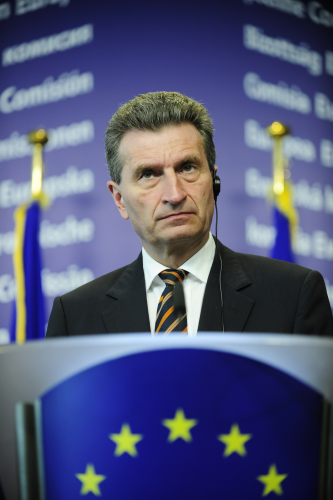
“Creating a sustainable economy is as challenging as ever,” says Günther Oettinger, the EU Commissioner for Energy, in his keynote speech at the European Sustainable Energy Week.
“As Energy Commissioner, I will push for the policies and programmes which Europe needs to make the transition to deliver its commitments by 2020,” he noted. “In parallel, the stage for large levels of decarbonisation by 2050 will also be set without delay.”
The European Union has made a “clear commitment to increase the share of renewable energy and reach 20% in the final energy consumption by 2020,” he added. Documents submitted by member countries indicate that the EU should exceed its target “but there is no room for complacency; further progress is expected.”
Engagement is top priority
“We must engage all levels of society” and the Intelligent Energy funding programme will make €56m available for applicants. There is also an urgent need to reduce administrative barriers to development of renewable energy projects and the needed infrastructures, and the heating sector must be addressed and ensure that energy efficiency and renewable energy polices complement each other.
“We have to introduce new criteria in the development of the electricity network; we will need smart grids, but also strong long-distance power transmission and new interconnectors,” he added.
On transport, “biofuels will play a key role in making this happen but, of course, have to meet the agreed sustainability criteria.”
“Reaching our goals in renewables and energy efficiency means creating well above 1 million new jobs for Europe,” he said.
“Energy efficiency is the most cost effective method to improve energy security,” he added. “Many investments into lighting efficiency, appliance efficiency and insulation of existing buildings pay off within a few years.”
Energy plan to make renewable energy competitive
The European Strategic Energy Technology Plan is being developed to make renewable energy technologies competitive through accelerated technological development. The technology platforms in wind, solar, bioenergy, CCS, nuclear, smart grids and smart cities to 2020 will make “a step change in the technology learning curves.”
The investment in technology development must be increased, from the current €3bn per year to €8bn, and Oettinger’s directorate has started work on the long-term vision for energy policy to 2050.
“This is not as far distant as it sounds if we take into account the long time lag between energy planning and implementation,” he explained. “We will need bold and momentous changes, which will affect the lives of everyone.”
“Our goals are ambitious but achievable as examples are showing,” he concluded. “Despite the unsatisfactory outcome in Copenhagen and the difficult economic situation, Europe has to continue to pursue proactive and visionary policies on energy efficiency and renewable energy. This is not only about reducing fuel bills, it is about our competitiveness and our jobs.”
European Sustainable Energy Week
The European Sustainable Energy Week attracts 3500 participants from across Europe. It features 90 events in Brussels and 270 energy days across 28 European countries, and is the culmination of a year-long effort by 1200 organisations and 10,000 people involved in sustainable energy in Europe.
